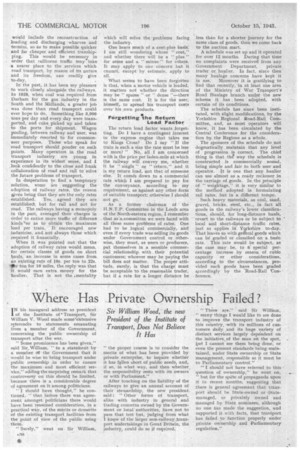Where Has Private Ownership Failed? .
Page 32

If you've noticed an error in this article please click here to report it so we can fix it.
Sir William Wood, the new President of the Institute of Transport, Does Not Believe It Has
I N his inaugural address as president
of the Institute of. Transport, Sir William V. Wood made someextensive referenees to statements emanating from a member of the Government, concerning the public ownership of transport after the war.
" Some prominence has been given," said Sir_,William, " to a stateMent by a member cif the Government that it would be wise to bring transport under public ownership in order to ensure the maximum and most efficient service," adding the surprising remark that controversy on this should be limited, because there is a considerable degree of agreement on it among politicians.
"I should have thought," he continued, " that before there was agreement amongst politicians there would have been reasoned consideration, in a
• practical way, of the Merits or demerits of the existing -transport facilities from the point of view of the public using them.
"Surely," went on Sir William, " the proper, course is to consider the merits of what has been provided by private enterprise, to inquire whether it has fallen short of public needs, and, if so, in what way, and then whether_ the responsibility rests with its owners or with Parliament."
After touching on the liability of the railways to give an annual account of theirstewardship, the new president. Said: " Other forms of transport, alike with industry in general and trading concerns owned by the Government or local authorities, have not to pass that test hut, judging from what I know of the larger non-railway _transport undertakings in Great Britain, the. industry., could do so if required. " There are," said Sir William, " many things I would like to see done to improve the transport industry of this cduntry, -with its millions of customers daily and its huge variety of distinct services largely dependent on the initiative, of the man on the spot, tut I cannot see them being done, or even the present standards being maintained, under State ownership or State Management, responsible as it most be to Parliamentary control."
" I should not have referred to this question of ownership," he went on, " but for the spate of propaganda Upon it in recent months; suggesting that there is general agreement that transport should be State-owned or Statemanaged, or privately owned and managed by State nominees, although no one has made the suggestion, and supported it with facts, that tranSport has failed to function properly under private ownership and Parliamentary regulation."




















































